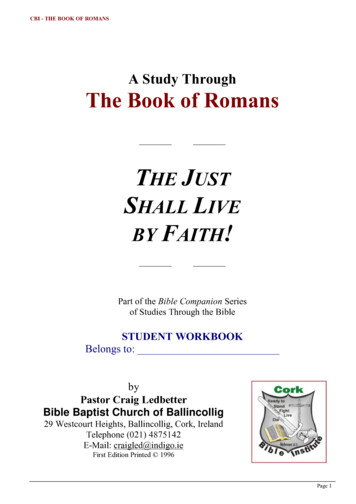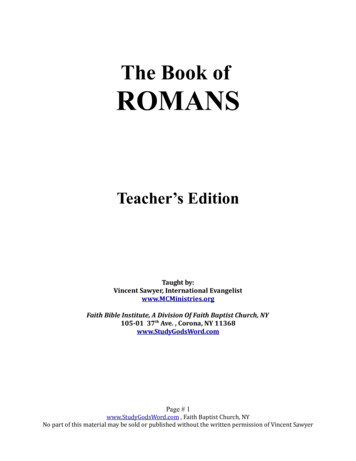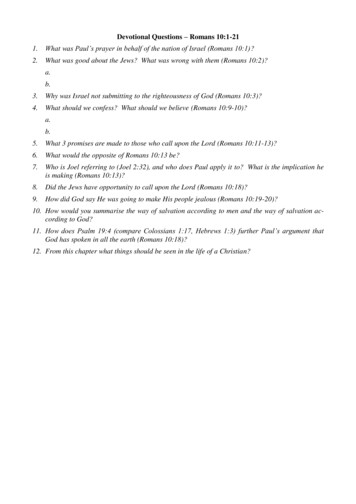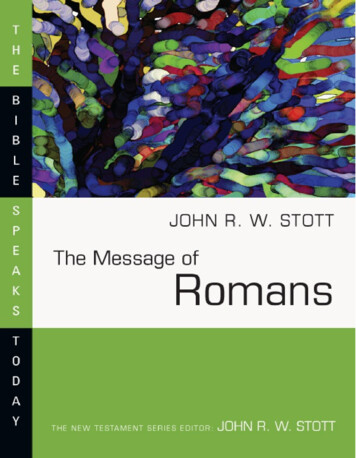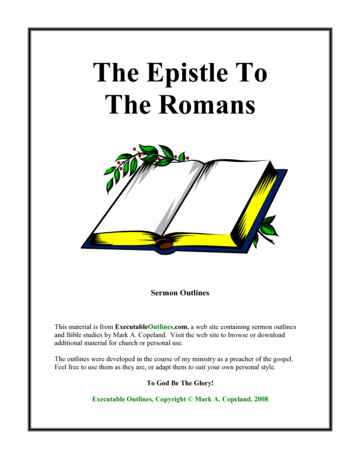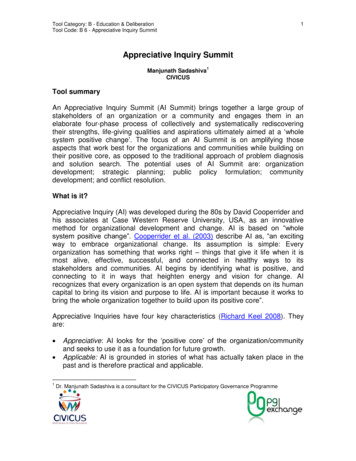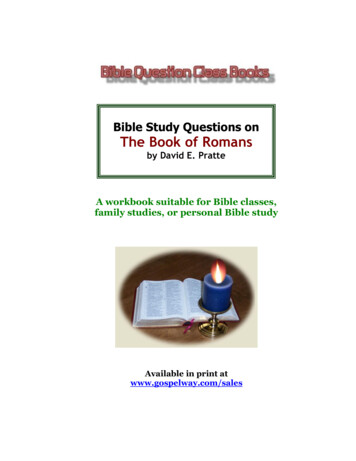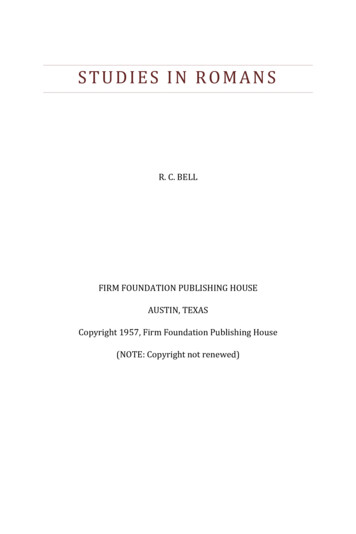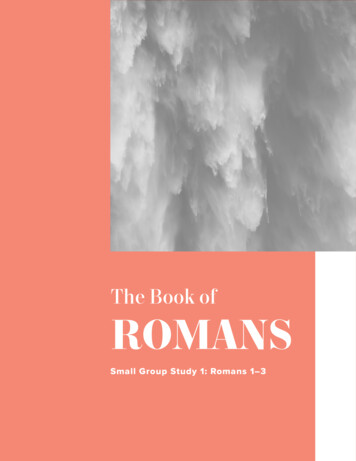
Transcription
The Book ofROMANSSmall Group Study 1: Romans 1–31
IntroductionIn 2019, The Summit Church will study the book of Romans together. Pastor J.D. willpreach through Romans all year long, and our Summit small groups will investigatethe message and meaning of Romans in our small group rhythms.Romans is an important and powerful book, and in this letter, Paul invites us to minethe depths of the gospel like never before. As we journey through this book together, we’ll grow to understand God’s righteousness, our unrighteousness apart fromhim, the significance of God’s Son Jesus Christ, and the implications of the gospelmessage for our everyday lives.This Bible study booklet includes six studies that comprise the first set in a largerseries of studies produced for Summit small groups this year. Each Bible study series is designed to aid both our personal study of Romans and facilitate our smallgroup discussions. This current volume will investigate Romans 1–3, which introduces us to God’s righteousness in the gospel.Throughout our year-long study of Romans, our hope is that we would all grow tosee the gospel with greater appreciation and to love God with greater passion, aswe seek to apply the messages of Romans in ways that impact our everyday livesand bear witness for Christ in our communities.2
How to Use This GuideEach study begins with some key verses and key principles for each passage, followed by adevotional introduction to prepare our hearts and minds. Then, the Study Guide section incorporates a series of questions specifically designed to help us engage the text of Romans inpersonal study and small group discussion, according to the H.E.A.R. method of Bible study: Highlight: Read and observe everything in the passage. Explain: Based on your reading, discover what the passage means in its context. Apply: Understand how the meaning of the passage affects your life. Respond in Prayer: Pray God’s word back to him, asking to believe, share, and put theBible into practice in your life and relationships.Work on these exercises at any time throughout the week. Some may find it helpful to workthrough the exercises in sections—such as two or three blocks of 15 to 20 minutes each, whileothers may want to study the whole passage in one, hour-long sitting. Whichever approach youchoose to take, please answer the exercises before your small group meeting. In small groups,we’ll discuss our answers to the Bible study questions together. To maximize our study of God’sWord and the impact it can have on our lives, we encourage everyone to work through all questions in each of the six weekly studies, but small group leaders may choose to focus on somequestions more than others.In addition to resources in this booklet, we also encourage you and your small group to takefull advantage of the following Romans-specific resources.Discipleship Group GuidesAs part of the Summit small group rhythms, we will produce Discipleship Group (D-group) guidesthroughout the year to assist your group in applying the truths of the gospel and the messagesof Romans, encouraging us to grow deeper in fellowship and accountability.3
Romans Scripture JournalThe Romans Scripture Journal is a special edition resource from The Summit Church to aid yourstudy of Romans in a few specific ways: The journal features larger font with extra spacing, wide margins, and blank pages andis designed to give you space to take notes and process what God is saying to youthrough his Word. The journal identifies key terms in bold that correspond with expanded definitions ina glossary at the back of the book. The journal includes recommended memory verses from each chapter of Romans,making it easier to hide God’s Word in our hearts (Psalm 119:11).Print copies of the journal are available in limited quantities at each campus and are free forthe people of The Summit Church, while supplies last at Next Steps. For a digital version, visitsummitrdu.com/romansjournal.Bible Reading PlanEncounter God by reading his Word every day in 2019. In order to help us make daily Biblereading a priority, we have released a daily Bible reading plan for the people of The SummitChurch. Our reading plan usually covers one chapter per day, and our scheduled readings allowus to read Romans in its entirety three times throughout the year. The 2019 reading plan alsofeatures many books with connections to Romans. Some books represent Scriptures quoted byPaul in Romans (e.g. Genesis, Psalms, Isaiah), while other books represent related themes (e.g.Galatians, James, Hebrews). Join thousands of brothers and sisters in Christ at The SummitChurch as we encounter God each day through our 2019 Bible reading plan. You can find theplan at summitrdu.com/plan.4
Additional Romans ResourcesFor even more resources, The Summit Institute has provided a list of recommended Romansresources to meet a variety of ministry needs. Visit summitrduinstitute.com/romans.5
Week One: (Romans 1:1–17)Key Verses“For I am not ashamed of the gospel, because it is the power of God for salvationto everyone who believes, first to the Jew, and also to the Greek. For in it the righteousness of God is revealed ” - Romans 1:16–17 (CSB)Key Principles Romans is about God’s gospel. The gospel reveals both God’s power and God’s righteousness. The gospel is for all peoples. Paul is going to show us throughout this book that every nook and crannyof the gospel has been proclaimed by the Old Testament prophetic writings, long before he took on the job of apostle. Romans provides information that is vital to our growth in our relationshipwith God.6
ReadRomans is a powerful book. The contents of its pages have changed the lives of many influential people in history (e.g. Augustine, Martin Luther, John Calvin, to name a few). One couldeven argue that much of Western history changed course because of the contents in this book.And over the next 12 months, we are going to study this book slowly to allow every ounce of itspower to be unleashed in our minds and hearts as we go through it together.This week, we will look at Romans 1:1–17. In the opening verse, we see that the Apostle Paulis the author of this letter (1:1), and these first 17 verses serve as the introduction of the book,where Paul: 1) introduces some key concepts about the gospel, 2) tells us the occasion for hiswriting, and 3) gives us the theme for his letter.1) Key Concepts (1:1–6)Paul wrote many of the letters in the New Testament, and he often began his letters in a similarpattern—introducing himself as an apostle of Jesus Christ for the sake of the gospel and providing a series of descriptive phrases that tell us more about the gospel and his mission.In Romans, this introduction takes up the first six verses. After introducing himself to the Romans as “an apostle set apart for the gospel of God” (1:1), Paul moves on to descriptive phrasesabout the gospel and his specific mission in it. Much of what Paul uses in Romans 1:1–6 is different from how he describes himself and the gospel in his other letters. We learn much moreabout the gospel in this introduction, but three points are unique to Romans and essential forunderstanding message of this book.First, Paul makes sure we know that this is God’s gospel. Other books of the Bible might mention phrases like the “gospel of Christ” (see Galatians 1:7; Philippians 1:27), and Matthew’s preferred phrase is “the gospel of the kingdom” (Matthew 4:23; 9:35; 24:14). But in Romans, Paulcalls it the “gospel of God”—defining our relationship with God himself. Even more broadly, Pauldescribes how the nations of the entire world relate to God. Verses 16 and 17 add further detail,saying that the gospel is important because it reveals both God’s power for salvation and God’srighteousness. This is God’s gospel, not anyone else’s.7
Second, this introduction tells us that the gospel has been God’s idea from the beginning oftime. Romans 1:2 explains that God had been promising this gospel would arrive one day, andthe fact that we have seen it come to fruition means two things—God is faithful to keep hispromises and is powerful enough to put them in motion. But this verse is also a foreshadowingof Paul’s approach in writing the letter. Paul is going to show us throughout this book that everynook and cranny of the gospel has been proclaimed by the Old Testament prophetic writings,long before he became an apostle.Third, the introduction declares that the gospel is for all nations (1:5). Sure, the gospel comesthrough Jesus, who is the direct descendant of the Jewish king David, but Jesus is also the Sonof God who will receive obedience from every nation (1:5). Paul will spend a great deal of timeshowing how Jews, Gentiles (or “Greeks”; Paul uses these words interchangeably), and everyhuman can take part in this gospel and what will happen to them if they do not.2) Occasion (1:7–15)Next, in Romans 1:7–15, Paul tells us why he is writing this letter. Paul longs to visit Christiansin Rome and preach the gospel to them in person. He knows that such a visit would strengthen(1:11) and encourage (1:12) his brothers and sisters in Christ. However, Paul chooses to write aletter to the Roman church at this time because he sees a strategic opportunity to meet withChristians and raise relief funds in support of the church in Jerusalem and Judea. The churchin Judea had fallen on hard times, and Paul believed that a collection of financial resourceswould strengthen relationships between Christians of diverse backgrounds—specifically, Gentile Christians and their brothers and sisters in Christ who were ethnic Jews.3) Theme (1:16–17)Romans 1:16–17 function as theme verses for Paul. In these verses, Paul gives his topic for theletter—the gospel. The gospel reveals both God’s power for salvation and God’s righteousnessto those who believe. And this gospel is for everyone (both Jew and Gentile).Read Romans 1:16–17 a few times before each week’s study to help keep you focused on Paul’smain theme.8
We’re going to learn a lot about God’s character by taking a deeper look at God’s gospel in Romans.So, buckle your seatbelts, whether you’re new to Christianity or you’ve been following Jesus foryears, Romans provides information that is vital to our growth in our relationship with God.Study GuideThe following study questions are meant to help us wrestle with the text of Romans and seehow the gospel displays God’s righteousness. Set aside some time this week to meet with Godand answer these questions for yourself. Complete each question before your weekly smallgroup meeting. Then, when you gather with your small group, be prepared to discuss your answers together.Read Romans 1:16–17 to remain focused on Paul’s major points. Then, read Romans 1:1–17in preparation for this week’s study.9
Highlight1. Reread Romans 1:1–17, keeping in mind that this is the introduction to a long letter. What mightwe expect to find in the rest of Romans based on this introduction?2. Looking at Romans 1:8–15, what does Paul want for the Roman Christians? What differentways does Paul express his affections for the Roman believers?3. Read Romans 1:1–6 again. Now, flip to the end of the book and read Romans 16:25–27. Whatsimilarities can we identify between the two sections?Remember, many in Paul’s audience would hear this letter recited out loud instead ofreading it with their own eyes. And writers in Paul’s time often repeated main ideasat the beginning and the end, which helped the audience remember key phrases andconcepts.4. In your own words, write a phrase or sentence that summarizes what you think the theme ofRomans is.We’ll come back to this exercise when we have finished studying the entire book andcompare your answers.10
1)2)3)4)11
Explain5. Romans 1:2 declares that the gospel was promised beforehand by God’s prophets in the HolyScriptures. Why is this important?6. Paul uses the terms “faith” and “belief ” several times in Romans 1:1–17. What do we learnabout faith from this passage?7. Romans 1:1–17 contains a number of words that are important for Christians—”gospel,” “salvation,” and “righteousness.” How are these words related to one another in Romans 1:1–17?Based on Paul’s use of these three words in this passage, how would you explain each term?8. What groups are mentioned by Paul in Romans 1:14? Why is Paul obligated to them and whatmust he do because of this obligation?9. Why is Paul not ashamed of the gospel? How should this understanding affect our lives?10. How is the righteousness of God revealed in the gospel?12
5)6)7)8)9)10)13
Apply11. What do you think Paul means by the phrase “obedience of faith” in Romans 1:5? What doesit look like to practice that obedience in our own lives?12. Paul says clearly that he is “not ashamed of the gospel” in Romans 1:16. What would it looklike to be ashamed of the gospel? How have you experienced temptations to hide what youbelieve about Jesus?13. Reflect on the ways Romans 1:1–17 shows us that Jesus deserves our worship and respect.How do these truths encourage you to share the gospel? Share the practical steps you willtake this week to display the gospel with your small group.14. What does it look like to mutually encourage one another as believers like Paul desired todo in Romans? How can we do that as a small group?15. Verse 6 says that believers are “called to belong to Jesus Christ.” What does it mean to belong to Jesus Christ? How is your life different because you belong to Jesus? What actions,decisions, or priorities is the Holy Spirit prompting you to consider?16. What questions do you want answered about the gospel, faith, or the book of Romans duringour study this year?14
11)12)13)14)15)16)15
Respond in PrayerIn Romans 1–3, Paul references specific psalms in order to grow our understanding of God’srighteousness. Each week of this Study Guide will include a recommended psalm that helps usfocus on the righteousness of our great God. Set aside some time this week to read throughthe selected psalm and use the prayer prompts below as your guide. We recommend prayingthrough this psalm on your own at home and together with your small group. And for thoselooking for more passages to pray, feel free to return to Romans 1–3 and pray through thosepassages as well.This Week’s Prayer Passage: Psalm 143Read Psalm 143.Pray through the following prompts, according to the A.C.T.S. method. Adoration: Give God praise for these characteristics that you see in Psalm 143: He is steadfast (143:8,12). He is merciful (143:1). He is righteous (143:1,11). He is faithful (143:1). He is what our soul truly needs (143:6).Confession: Plead with God for his mercy. The Lord has every right to judge us for ourunrighteousness. Confess to God how we have not been steadfast and faithful like hehas been to us. Thanksgiving: Thank God for the following blessings: God lifts our souls and guides us when we are down. God already has victory over our greatest enemies—sin, death, and the devil. Thank God that he has maintained his relationship with us in his steadfast love.16
Supplication: Ask God that he would help lift our spirits where situations in our liveshave made us downcast (143:3–4). Ask that God would guide us in your next steps inour lives (143:10). Ask that God would be our refuge (143:9).17
Week Two: (Romans 1:18–32)Key Verse“For though they knew God, they did not glorify him as God or show gratitude. Instead, their thinking became worthless, and their senseless hearts were darkened.”- Romans 1:21 (CSB)Key Principles God brings judgment against all unrighteousness and it is right for him todo this. Ignoring God prompts him to give people over to all sorts of problems andsins. The God of the gospel cannot be truly glorious to us without a profoundunderstanding of our real problem. Those who have been forgiven much will demonstrate great love in return.18
ReadThere are a few recurring themes throughout the entire book of Romans that Paul brings up inthe first three chapters: The profound equality that all of humankind shares in the eyes of God. God’s righteous judgment on all those who choose to worship creation over Creator. The sharp contrast between righteousness and unrighteousness.As to the third theme, Paul ends Romans 1:17 with the sentence, “The righteous shall live byfaith.” This quotation, referring to Habakkuk 2:4, raises the topic of righteousness, a recurringtheme in Romans that Paul often uses to describe both God and faithful people who are inright-standing with God. A basic definition of righteous is morally right or virtuous. Righteousness, then, is an attribute, a characteristic, and a state of being—the extent to which one ismorally right or virtuous. For example, when Paul mentions God’s righteousness, he is oftendescribing how God is faithful, true, and just (Romans 3:1–8). Other times, Paul is talking abouthow God’s righteousness is a gift that he has given believers. Through Christ, we get to claimhis righteousness, his right-standing with God, as our own. What an amazing gift! Throughoutyour reading, take note of how Paul uses the word “righteousness” and who it describes.In Romans 1–3, Paul begins his explanation of righteousness by describing what righteousnessis not. In other words, in order to help us understand how righteousness works, Paul spendsthe next few chapters showing how unrighteousness works. And just like you would imagine, itis the opposite of all that is faithful, true, and just.The first thing we need to know is that God judges unrighteousness. Romans 1:18 carries themessage that God is currently against all unrighteousness, will actively thwart it in the present,and will destroy it completely in the future. At first glance, any of us might be tempted to excuseourselves from being labeled “unrighteous.” After all, the description of unrighteousness inRomans 1:18–32 lists some of the worst sins and behaviors we could imagine. Yet Paul explainsin Romans 1:18–32, that God’s wrath and judgment fall upon those who practice any of this unrighteousness. Let that idea sink in. When any of us do just one unrighteous act or think oneunrighteous thought, we deserve to die (1:32). This means that all of us are guilty of practicing19
unrighteousness and deserve God’s judgment. And we deserve God’s judgment because God isperfectly righteous, so any amount of unrighteousness is unacceptable for our righteous God.But how can this be? How did we get like this? Did we really become slaves to all sorts of evildesires? First, God has made himself known through creation, so that we would worship him(1:19–20). All of us have foolishly worshiped creation instead of the Creator and now our heartsare darkened because of our rebellion (1:21). Though God has given us his matchless glory, weignored him and settled for worshiping idols (1:23). Then, we started practicing all sorts of eviland unrighteous behavior, and we gave approval to those who did the same (1:32). It is a scaryprogression and one that we all are equally guilty of following apart from God’s grace in our lives.Paul repeatedly states that because God is a good and righteous God, he must judge all unrighteousness. They dishonored God, so he, in turn, dishonored their bodies by delivering themover to corrupt desires (1:21–24). They exchanged God for images and exchanged his truth fora lie. Thus, God gives them over to exchange their natural desires for unnatural ones (1:23–27).And because they did not think it worthwhile to acknowledge God, God delivered them over toa corrupt—literally translated as disacknowledged—mind (1:28). Every form of sin is met with anappropriate righteous judgment from God. Consider the sins listed in this section and how theyare not only the cause of God’s judgment but also the evidence of God’s judgment on the world.This means that the more we make it our practice to ignore God, the more we prompt God togive us over to different forms of unrighteousness. For example, when we sin with our wordsand lash out in sinful anger and bitterness against another person, God often gives us over tothe consequence of friction in the relationship. Each of us can probably think of other practical examples in our own lives and communities. The seriousness of our unrighteousness andGod’s wrath can be seen in an illustration from 20th-century British author and professor C.S.Lewis. According to Lewis, God’s judgment is not about a vindictive, malicious God tormentinginnocent people. Instead, as Lewis metaphorically stated, “There are only two kinds of peoplein the end: those who say to God, ‘Thy will be done,’ and those to whom God says, in the end,‘Thy will be done.’ All that are in hell choose it.” 1 As we look around at unrighteousness in our1 C. S. Lewis, The Great Divorce (New York: HarperCollins, 2001), 75.20
world, and more importantly, our own lives, we should be sobered by the seriousness of God’srighteous wrath.In Romans, God does not offer us a superficial diagnosis of our problem. He mercifully teachesus that our deepest problems concern sin and wrath. All of us are sinful in rejecting God, andGod himself has righteous wrath against us. Knowing the true nature of our problem will help uscherish God’s kindness in the gospel. Romans 1:18–32 lays out the things that God must overcome in order to save us. He must remain righteous and true to himself, yet forgive and transform sinners. Can a good and righteous God ever simply let sinners walk away free? If God isrighteous, he must offer exact retribution. Christ would take on every bit of the righteous wrathof God for those that would trust in him. What kind of God would do such a thing? The God ofthe gospel cannot be truly glorious to us without a profound understanding of our real problem.Hopefully, taking a closer look at what happens to the unrighteous makes us realize the terribleand undesirable outcomes of consistently choosing unrighteousness. Paul explains that we areall equally lost without God’s grace and we all have a desperate need for God’s glorious gospel.Understanding this deep need for a Savior will help us appreciate how much Christ has done tosave us. As Jesus himself explains, those who have been forgiven much will demonstrate greatlove in return; “but the one who has been forgiven little, loves little” (Luke 7:47). Consider thisweek how dark our paths were without Christ, how much God has given us in Christ, and howmuch we still need God’s grace.Study GuideThe following study questions are meant to help us wrestle with the text of Romans and seehow the gospel displays God’s righteousness. Set aside some time this week to meet with Godand answer these questions for yourself. Complete each question before your weekly smallgroup meeting. Then, when you gather with your small group, be prepared to discuss your answers together.Read Romans 1:16–17 to remain focused on Paul’s major points. Then, read Romans 1:18–32 in preparation for this week’s study.21
Highlight1. What words does Paul use to describe the actions of unrighteous people in Romans 1:18–32?What words does he use to describe God’s actions? Do you see any similarities?2. How are humankind’s actions related to God’s actions in Romans 1:18–32?Hint: Notice the phrases “therefore” (1:24), “for this reason” (1:26), and “because” (1:28).3. From what we know so far in Romans 1, contrast how Romans 1:18–32 describes an unrighteous person with what we might assume about a righteous person. Share your reflectionswith your small group.4. What comes to your mind when you think about the wrath of God? Now, read Romans 1:18–32again. How does Paul think about the wrath of God?22
1)2)3)4)23
Explain5. According to Romans 1:18–32, what is idolatry and how does it come about?6. How do people “suppress the truth” (1:18) of God by what they do and what they do not do?7. Paul repeats three times in Romans 1:18–32 that God “gave them up” or “delivered them over”(1:24, 26, 28). What do these phrases tell us about God and about ourselves? What is Paulemphasizing through this repetition?8. What does it mean to be “without excuse” (1:20) and why is this important for how anyoneunderstands the gospel?9. What is the overall point Paul is trying to make in Romans 1:18–32? How does this relate towhat Paul said in Romans 1:1–17?24
5)6)7)8)9)25
Apply10. Paul describes idolatry in terms of how it developed in ancient times, producing woodenstatues and false gods. What are some of the ways that our culture expresses idolatry today?How do we worship things other than God?11. God deserves our first and our best in everything, whether it is our time, our talent, or ourtreasure. What things in your life challenge God’s place for the first and the best?12. Where are you guilty of judging and condemning others for sins that you excuse in your ownlife? How might the gospel influence such tendencies?13. How have you seen God’s wrath at work in the world? In your own life? In your small group?14. Is it hard for you to agree that, according to Romans 1:32, people deserve spiritual death?Why or why not?26
10)11)12)13)14)27
Respond in PrayerIn Romans 1–3, Paul references specific psalms in order to grow our understanding of God’srighteousness. Each week of this Study Guide will include a recommended psalm that helps usfocus on the righteousness of our great God. Set aside some time this week to read throughthe selected psalm and use the prayer prompts below as your guide. We recommend prayingthrough this psalm on your own at home and together with your small group. And for thoselooking for more passages to pray, feel free to return to Romans 1–3 and pray through thosepassages as well.This Week’s Prayer Passage: Psalm 10Read Psalm 10.Pray through the following prompts, according to the A.C.T.S. method. Adoration: Praise the Lord for he is your King forever and ever (10:16). Praise the Lordbecause he is the helper of the weak (10:17–18). Praise God because he is the immovable, unchangeable I AM. Confession: Ask God for forgiveness for thinking that he is far away from you in yourtimes of trouble (10:1). Confess to him your pride and all the ways that you have actedlike he does not exist (10:4). Ask for forgiveness for the ways you have been puffedup by pride (10:3 ff.). Thanksgiving: Thank God that he does not forget the afflicted and brings justice tothe oppressed (10:12–18). Thank God for his right judgment on the wicked (10:15).Thank God that he is an ever-present help in times of trouble. Supplication: Ask God that he would be near to you in the ways that you are experiencingtrouble right now. Ask God to show himself in the midst of your present circumstances.28
Week Three: (Romans 2:1–16)Key Verse“For there is no favoritism with God.” - Romans 2:11 (CSB)Key Principles We are all equally guilty in God’s eyes and God’s judgment is righteous. The law did not produce righteousness in the Israelites. God has provided one way of salvation that unites diverse peoples.29
ReadBefore we dive in, it’s worth noting that the word “law” can refer to multiple things in the bookof Romans. First, law may refer to the entire Old Testament, as in Romans 3:19, where Paulquotes from the Psalms and Prophets. Second, Law with a capital “L” may refer to the Pentateuch, the first five books of the Old Testament (see Luke 24:44). Finally, law may refer to theSinai covenant found within the Pentateuch (see Galatians 3:17).In Week Two, we began looking at three themes that will keep coming up in these early chapters of Romans, themes which will also set a tone for the rest of what Paul wants to accomplishin Romans as a whole. Those three themes are: Humankind’s equality, God’s judgment, and The difference between righteousness and unrighteousness.In Romans 2:1–16, Paul adds new insight to what he has already taught on these topics. He doesso most pointedly in verse 11, with a bold statement that “there is no favoritism with God.” Thisstatement is actually a summary of a profound truth from Deuteronomy 10:17 and Job 34:19,where the Old Testament goes into detail about how God does not favor some—such as thosewith wealth or status—over others. We are all equal in God’s eyes.We cannot understand the gospel, and the rest of what Paul will be writing about in Romans,until we let this concept sink in. God shows no partiality. What does this mean? From God’sperspective, there is nothing that we can bring to him on our own, or brag about with our ownwords, that will ever make him change his mind about us. This is both good news and bad news.God’s lack of favoritism begins as bad news in these early chapters of Romans. As we haveseen in Romans 1:18–32, all people are unrighteous, and God looks upon unrighteous peopleas deserving of his wrath and judgment. It does not matter what station or job we are in, howmuch status or influence we have, what color our skin is, or even how rich or talented we maybe. None of these things impress God. None of these things can fix our unrighteousness be-30
fore a righteous God. God sees right through the surface, examining the core of who we are todetermine whether or not we have truly chosen life in his name (see Deuteronomy 30:15–20).But this same attribute—God’s lack of favoritism or impartiality—becomes good news for us inthe gospel. Since we could never earn our standing before God on our own, God decided togive us righteousness as a gift, by his grace, and through faith in Jesus. And this gift is givento all people, regardless of status, merit, or ethnicity.Paul will describe this more in the chapters to come, but he mentions God’s impartiality here inorder to convince Jews and Gentiles (or “Greeks”; Paul uses these words interchangeably) thatthey must be unified in the gospel. Paul shows that they are all under condemnation; therefore,both groups must acknowledg
In 2019, The Summit Church will study the book of Romans together. Pastor J.D. will preach through Romans all year long, and our Summit small groups will investigate the message and meaning of Romans in our small group rhythms. Romans is an important and powerful book, and in this letter, Paul invites us to mineFile Size: 692KB
